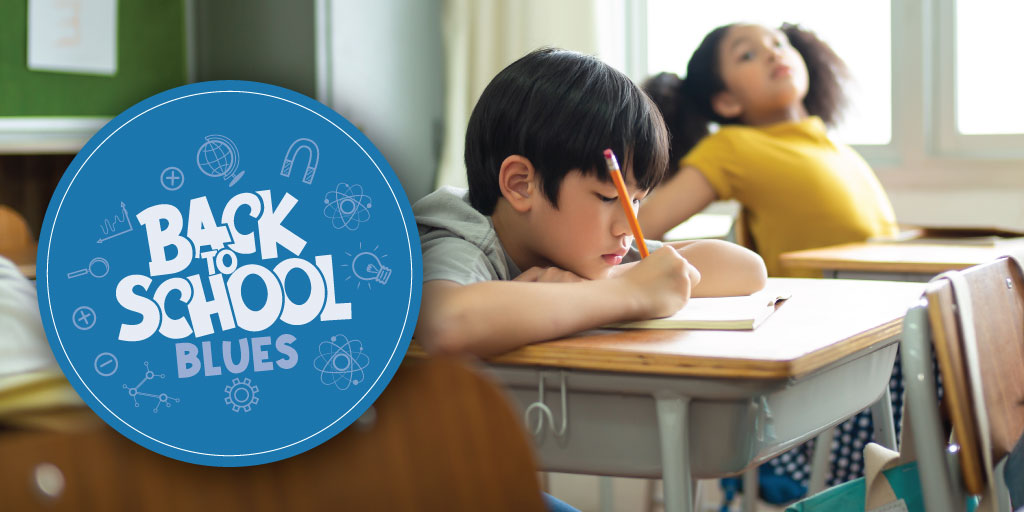The Back-to-School blues are something that both parents and teachers will understand. Holidays tend to give children more freedom, later bedtimes, and less rigid routines. Making coming back to school a shock to the system! We know that as the weather gets cooler and the nights get longer, this can be especially hard on a child’s mental health.
Advise parents to follow a school routine
Parents should have a clear routine before school starts. Why? Because it makes it much easier to get back into a routine when school does start!
Set out clear guidelines in your communications with parents for creating effective routines. You can even include sample printed timetables and some general features. Include space for relaxation, doing homework and organising their school bag.
You can create timetables based on your school colours or ethos and advise parents to keep them visible to all the family. That way, anyone in the family can remind themselves of what they need to do at any time of the day. Teachers can then follow up with parents if they think of any features that would be effective based on what they see in class.
Encourage physically active routines in the holidays
Getting children involved in holiday camps can be a great way to ensure that early mornings and bedtimes aren’t such a shock when the term rolls around. Not only are these great for socialising and keeping them fit and healthy, but they can help them establish sports and other activities they like doing.
Adding discipline to their routines with activities they enjoy will encourage them to keep them and stave off any anxiety. It will also give them something to look forward to in the holidays and for term time. They can learn new skills during the holidays and show them off when term starts!
Start each year afresh with a ‘clean slate’
It’s easy to bring old gripes into the new year. Encourage a fresh slate for teachers and pupils. Renewing old problems will prevent pupils from feeling confident about a new year of learning. Let go of those old problems and help your teachers and pupils strive for new targets and new ways of thinking every term.
Use your classrooms to start afresh too. Teachers should look to decorate their classrooms with positive goals and targets. Outline the school ethos and add some of their own personality to their classroom walls and layout. Try adding more space between desks for younger pupils, helping teachers add more opportunities to be active and interactive during class time.
Remember, there’s no academic subject that can’t be enhanced with physical activity!
Encourage interactivity in lesson plans
Get all your teachers to add interactivity to their lesson plans. Lesson plans should contain opportunities for pupils to work in their peer groups, especially if those groups change on a regular basis. Examples include acting out emotions, pointing to colours in the classroom or working together on class projects.
Changing their peer groups and offering interactive lessons can help stave off bullying and anxiety. It can give pupils a chance to work with pupils they don’t know and to appreciate the skills and input they bring to projects.
Physical activity is an important part of keeping lessons interactive. Some students will be engaging in PE for the first time, so make sure the lessons you plan are accessible. Aim to promote full engagement with PE, not just those who are interested are able and treat conversations about PE positively.
When a teacher announces that it’s time to change for PE, this should always be greeted positively. Offer a fun and varied curriculum because those first impressions of PE are vital to keeping children fit and healthy in the future.
Build trust in your parent community
Open communication with parents is essential to picking up on those markers that pupils have the blues! Especially with new parents to the school, building trust right from the outset is important. Strengthen your teachers’ ability to teach effectively by building relationships at the beginning.
Make sure the information about contacting teachers and the senior team is available on your website. Consider setting up an area of your newsletter that allows parents to provide tips and tricks for good parenting or organisation. It can be a place to share best practices and advertise new activities available at school for example.
Ensure clear lines of communication with the senior team
Teachers need the support of an involved senior team to safeguard the mental health of their students. Clear lines of communication help build confidence for teachers. They can then freely give advice for making pupils feel more at home or point out the pupils who need a little help (or a lot) to get back into the swing of things.
Make sure your senior team is open to hearing from teachers and parents when they have concerns. You can prevent issues of anxiety from becoming serious blocks to their learning with open communication. Remember, prevention is always better than a cure!
First Step PE aims to create an engaging and varied programme of PE for children. And getting children settled into school life and its routine helps us to give them the best of what physical activity has to offer. Not only do we support your pupils, but your teaching staff too. Through PE, we can create confident learners that excel in all areas of school life.
First Step PE. Take your First Step to PE excellence with us.



